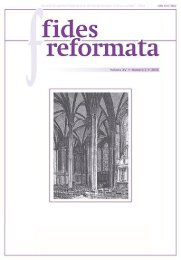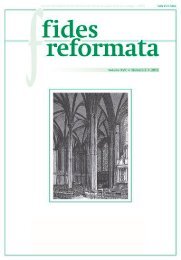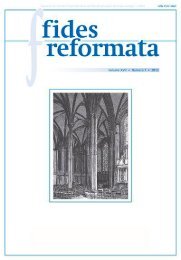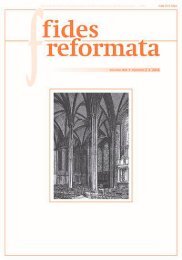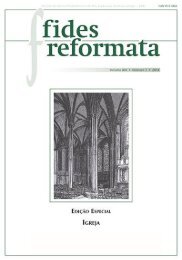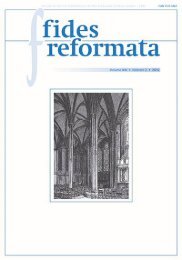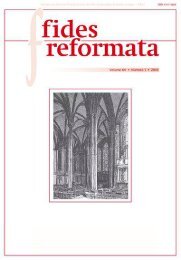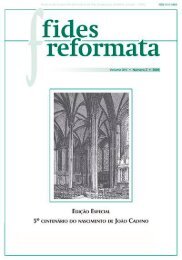Fides 18 N2 - Revista do Centro Presbiteriano Andrew Jumper
Revista Fides Reformata 18 N2 (2013)
Revista Fides Reformata 18 N2 (2013)
You also want an ePaper? Increase the reach of your titles
YUMPU automatically turns print PDFs into web optimized ePapers that Google loves.
FIDES REFORMATA XVIIi, Nº 2 (2013): 99-115<br />
we keep the Ten Commandments, there may be a better way to look at Adam’s<br />
job assignment.<br />
Adam and Eve’s assignment is recorded in Genesis 1:28:<br />
And God blessed them. And God said to them, “Be fruitful and multiply and<br />
fill the earth and subdue it and have <strong>do</strong>minion over the fish of the sea and over<br />
the birds of the heavens and over every living thing that moves on the earth.”<br />
This calling has become known as the cultural mandate. I suggest that<br />
observance of the moral law, rather than pictured as a job to be fulfilled in<br />
addition to the cultural mandate, is better viewed as defining how the job is to<br />
be performed or how the job is to be performed righteously. This means that for<br />
the cultural mandate we may use the language of production of a commodity,<br />
but we should not <strong>do</strong> so for moral obedience. Keeping the Ten Commandments<br />
is not the job or a job assigned to humankind, but a definition of the rules for<br />
how the job is to be performed.<br />
In God’s original order for man there was work to be performed, an earth<br />
to be cultivated and conserved, a world to be populated and <strong>do</strong>minion to be<br />
exercised. In order to fulfill this work, Adam and Eve received God’s blessing.<br />
As altogether dependent on him in whom they lived and moved and had their<br />
being (cf. Acts 17:28), they could work out their service with perfect love,<br />
knowing that God would be at work in them both to will and to <strong>do</strong> his good<br />
pleasure (cf. Phil 2:12-13; 1 John 4:<strong>18</strong>). Faithfully persevering in trust in their<br />
Creator and his promises, they walked by faith in the works that had been prepared<br />
for them beforehand (cf. Eph 2:10). This is how they carried out their<br />
job with righteousness before they fell into sin. 11<br />
Righteousness is not a job to perform. It is to perform a job rightly.<br />
Righteousness is not to win a race. It is to run a race according to the rules.<br />
Justification is not a declaration that the race is over or has been won. It is to<br />
declare that it is being (or has been) run fairly. For a correct understanding<br />
of righteousness and justification it is fundamental to bear in mind that righteousness<br />
must precede job performance (and, of course, be maintained during<br />
and after the fulfillment of the task). Adam and Eve could not carry out the<br />
assignment without first being righteous. They needed to be right and good<br />
in order to <strong>do</strong> their work and did not become righteous or more righteous by<br />
11 This perspective of dependence on the Lord and his empowerment contrasts sharply with that<br />
of John MacPherson writing about the covenant of works, The Westminster Confession of Faith: with<br />
Introduction and Notes (Edinburgh: T. & T. Clark, <strong>18</strong>82), p. 66, “The obedience must be personal; no<br />
special aids are promised or allowed, but by the creature’s own natural strength is the covenant to be<br />
fulfilled. Grace may have been shown in the condescension that entered into a covenant, but the covenant<br />
in its terms is not of grace but of works.”<br />
107





